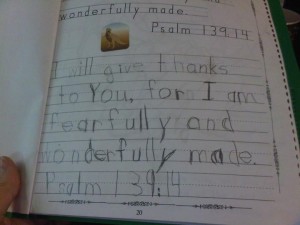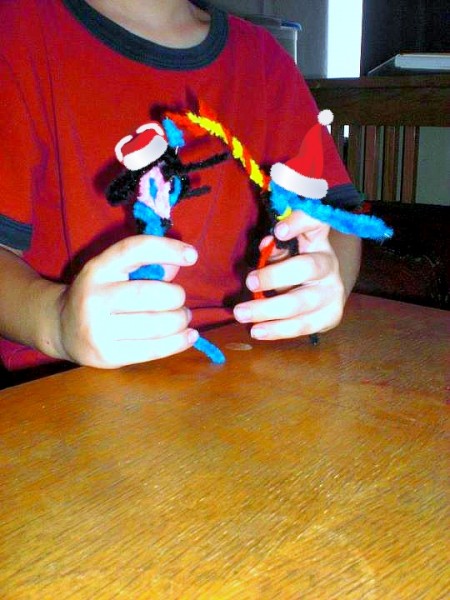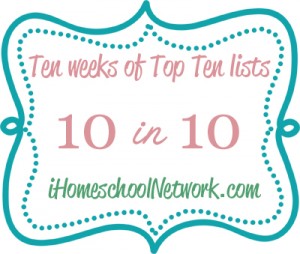 Ten Homeschool Questions YOU Wanted to Know about Homeschooling here at Classic Housewife
Ten Homeschool Questions YOU Wanted to Know about Homeschooling here at Classic Housewife
Yes. Today I put myself under the homeschool interrogation lamp and I answer YOUR homeschool questions. I invited you to ask, you answered, and now I hope you have fun as I answer for this little Classic Housewife Q&A. Enjoy!
Q1: Do you use a set curriculum and have your children maintain a strict schedule or are you more relaxed and gather or create your own curriculum?
A: I’m an eclectic homeschooler, and by this point we’ve settled on a good core curriculum. It’s not an “all in one box” kind of thing, it’s a good mix of materials that we’ve discovered and come to love over the years. We don’t do “schedule” nearly as well as we do “routine.” Bible and math and language arts every day, history on M-W-F and science on T-Th is our general goal. We start with bible by mid-morning and work until lunch, then we finish up after lunch. We add in a variety of activities depending on what we’re studying.
Q2: What are your kids favorite subjects?
A. NOT MATH. =p Although, Drama Queen and Little Prince actually like math most days. All of my kids love to do anything artsy – draw, paint, play with playdoh. They love it. Little Prince is fascinated by Science, Drama Queen would play guitar all day, and Princess enjoys reading in addition to art. They don’t mind history too much, either.
Q3: Do you have a set room for schooling or do you school all over?
We’ve been back and forth with this. We began in the dining room, then we took up residence in half of Big Daddy’s separate office, then we moved back inside and we’re now in the living room. The living room has its pros and it’s cons. I anxiously await the day that we move out of this house and into another where we can have either a school room, or at least a school area (like half of an office space or something.) Seems to me that the school room was the best for us. Here in the living room it’s too easy to hear the call of the tv, the computer games, the toys in the bedroom even..
Q4: Talk to me about record keeping. Do you use a grading system?
A: Oy! Record keeping! It’s both a blessing and a curse that Texas does not require me to turn in any record keeping. (Because whereas I assign and grade papers, I stink at recording them. Perhaps if I HAD to, I would find a way to make it happen?) That said, for our own homeschool, I don’t really see the purpose in keeping records in the lower grades– if my kids had to suddenly move to public school, they would have to test into their grade anyway, they wouldn’t take MY word for it. However, for high school ages, grades are a necessary component of building a transcript.
I fully intend to keep good records for high school — which means I need to start building some good habits ASAP! And to that end, I’ve been trying to work toward that goal for the past couple of years. I’ve tried using a computer-based recording system; I’ve tried using the record section in my spiral-bound Well Planned Day Planner. I’ve decided that in order to get a handle on this, AND teach Princess some better organizational skills and diligent habits than what I have myself, I’m actually going to enlist Princess’ help with record-keeping next year. I will set up a gradebook, and I will grade her paper, but then she can go log the grade in the book. Perhaps together we can conquer this!
As for grading, I would really call it more like “Checking and making them redo it” at this point. While they are young, instead of having them continue to repeat and make the same mistakes and learn bad habits, I have them redo the problems/questions. This serves double duty — if they still don’t get it, I know that it wasn’t a simple mistake but they really don’t “get it” well enough, so we have a quick tutorial and do it again.
Q5: Do you file and keep samples?
A. If you only saw the mounds of papers sticking out of my bookshelves and filing cabinets. =p Up to this point, pretty much EVERYTHING has been stuffed in a folder or spot of some kind and kept until the end of the year. At that time, I usually toss most of it and keep some of it, depending on what it is.
Recently my mind wandered upon a really great idea. I mean, a really GREAT ONE. What if I were to scan all of those assignments in and keep a DIGITAL copy?? I wouldn’t have to hang on to all of those papers all year long. I’m talking about all the worksheets and paragraphs and essays and handwriting practice… the things we overflow in.
Also, last year we began a new tradition of making a “yearbook” of sorts at the end of the year. If I scanned things into the computer I could also include pictures of drawings, paintings, handwriting samples, stories, and so on. Of course, I would end up keeping some sentimental type keepsakes. I’m still a mom. =) And things like the notebooking binders we’re building, paintings,..those will be kept for sure.

Q6: What are their learning styles and how do you incorporate the styles in to your teaching methods, especially with more than one child?
Some days it feels like their learning styles are all over the place. 😉
Princess is primarily visual and I think secondarily kinesthetic. I have to remember that she does best if she sees the book while I read aloud for group classes, although it’s also helpful if she draws or colors while I listen because that helps her listen and retain better. This is one of the reasons I’ve begun implementing more notebooking because I think it will help her to retell it and write it down and illustrate it. This also affects the math we choose for her, and the way we practiced learning math facts (which was NOT by reciting them!)
Drama Queen is, I think, primarily auditory and secondarily kinesthetic, though it may be the other way around. This is very frustrating for me because when I’m explaining something on paper (how to borrow from the tens column for example) I want her to look at what I’m doing and watch to see how I did it – she responds “I’m listening!” and I say, “But you’re not watching!” I have to help her focus and pay attention to which numbers I’m pointing at so that she understands the auditory instruction I’m giving along with it. But, while we’re on the subject of math, she’s left brained (and I’m not) so sometimes I just have to call left-brained Big Daddy in for reinforcement. =p Outside of math, she listens while I read aloud (but she doesn’t LOOK like she’s listening) — I just have to allow a certain amount of leeway for her, and I try to remember to remind her to get something to keep her hands busy while she listens. Notebooking is good for her, too, because she can take what she heard and put it all down on paper in an organized manner, working on her visual presentation of it all.
Little Prince is the youngest so it isn’t easy to tell except that he’s primarily kinesthetic — yep, they’re all three different. I THINK visual is his secondary, the kid loves picture books and drawing and watching movies and remembers almost anything he sees. Then again, he remembers almost anything he hears, too. The main thing I have to remember with him is keeping him busy while I read aloud and that’s why I encourage him to bring out some legos or pipe cleaners to play with while he listens.

So for my three similar but different children, I have some things I read aloud, I have some bookwork they do independently, we have our hands on experiments and projects, we do notebooking and coloring pages, we use videos and documentaries and a variety of literature and reference-type books… we use a little bit of everything. And while we’re doing one thing (such as reading aloud) I try to help the ones who don’t succeed as well with that method, cope and succeed as best as they can with learning strategies (such as manipulatives, retelling, and notebooking.)
Q7: Teaching multiple grade levels…what subjects do you combine for group teaching and which ones really need to be individual?
A: Bible, history and science are very easy to teach to multiple grade levels, if you find a good curriculum that is easy to teach across the grades. Bible curriculum should be easy enough to find. We use Apologia Science and the Mystery of History. I cannot praise these two highly enough. You *can* teach *some* math and language arts together, if they’re close enough in age or ability or interest – but they are also each going to need some instruction and work to do that is at their ability level and presents enough challenge to grow but not too much to hinder. We’ve done Grammar Land and Times Tales together as a group, for example, but each of the kids has their own appropriate math book and language arts materials to do on their own.
Q8: We really want to focus on character building! How do you incorporate lessons on character in your school day?
A: As I mentioned, we start our day, every day, with bible. We are doing “Who is God” for Bible/Worldview but we also have “For Instruction in Righteousness” which is simply a book of scripture categorized by trait such as Laziness (and then it also includes the verses for diligence and hard work, so you can practice the take off and put on principle.) We pepper character lessons in between our Who is God? lessons while using this book for reference. However, any kind of scripture index categorized by topic will do. But of course none of this is as effective as training in the moment, which is also the hardest. And because they’re siblings.. we have plenty of opportunity to work on this throughout the day!
Q9: What’s the hardest thing about homeschooling for you family?
A: The fact that they’re brothers and sisters. No, REALLY. Teaching is hard enough without “she’s sitting too close to me!” And “he’s making a face at me!” But you know what? These are teaching opportunities, too! CHARACTER TRAINING. It’s trying work. But it’s good work.

Another hard thing is being diligent and consistent – it’s a regular struggle against wanting to take a day off or be lazy all morning before getting around to school. I’m amazed at how regularly on Monday morning I say, “let’s get going, it’s a school day” only to be answered with “what??? I thought it WASN’T..” Really? Since when?? =p
Q10: I lack self-discipline (i.e. Staying up late, sleeping in), any tips for a mom that wants to homeschool but struggles with a schedule!
A: You just described ME! I used to stay up reeeeally late, and then sleep in reeeeally late. (Even now it’s way too easy to stay up too late one night and get out of whack.) Back then, the kids were littler, school took much less time, we mostly did school after lunch while Little Prince was napping. The good news is that 1.) If you try, you really can get up earlier — now I’m no early bird by other people’s standards, I get up at 7am and that’s plenty early for me! But it’s much earlier than 9 or 10! And also, 2.) You DO have some flexibility, that’s one of the benefits of homeschooling. I wouldn’t indulge in it too much, it’s too easy to go too far and be too lazy. But you can start off slow and start by getting up 30 minutes earlier and starting school at a certain time, and then 30 minutes earlier and so on, until you develop a good habit for what you think is a fair and decent time. You can do it!
THANK YOU so much for joining in and asking all of these questions, I really enjoyed it! If you have any more, leave them in the comments!
 This post is a part of the Top Ten Tuesday meme hosted by Angie @ Many Little Blessings (and the 10 Weeks of 10 series with iHomeschool Network.)
This post is a part of the Top Ten Tuesday meme hosted by Angie @ Many Little Blessings (and the 10 Weeks of 10 series with iHomeschool Network.)


It’s always nice to hear that I’m not the only one who has to break up fights between the siblings all day long! (and then don’t you find that there are those miraculous days here and there where they suddenly get along – all of them?!) Enjoyed reading your answers. I am a night owl and not someone who likes schedules either so I can relate!
You are definitely NOT the only one. =) And I love those good days and wait in anticipation between them, waiting for the next one to come around. 😉
I agree! the character training is the hardest part!
By far!! Math and reading are pretty black and white. Character training is messy work! =)
(But oh so important and rewarding!)